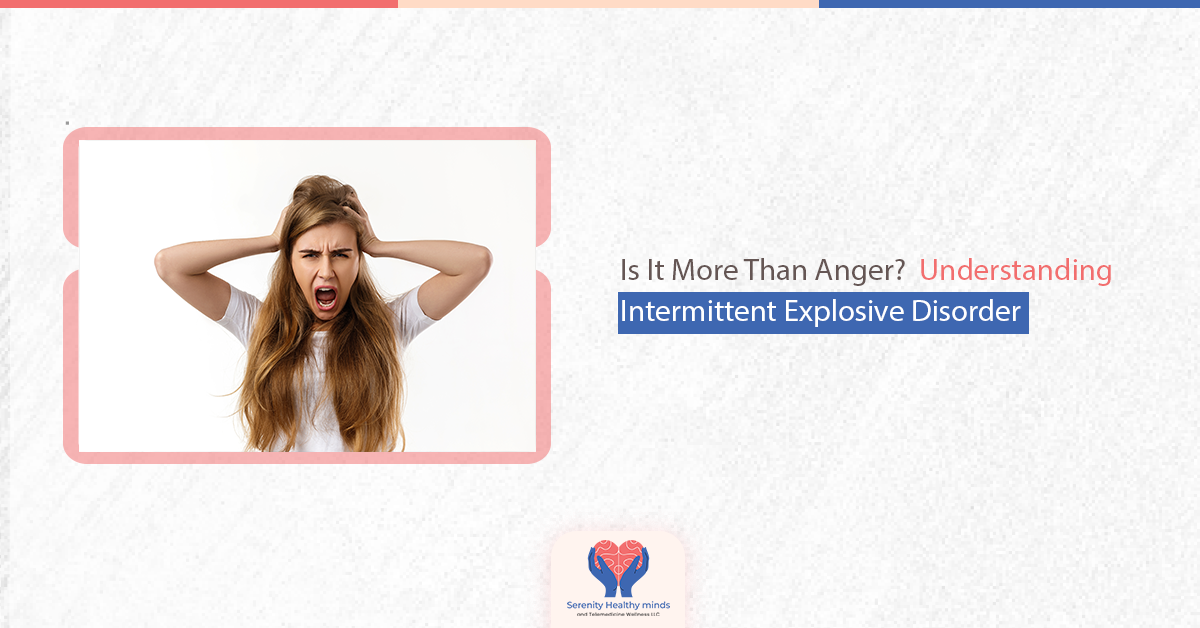You get angry when someone takes your belongings or mistreats you. Anger is normal. Most people calm down after a short time.
But some people get outraged very quickly. Their anger is bigger than the problem. They may yell, throw things, or even hit. Later, they may feel sorry. This may not be normal anger. It may be a health problem called Intermittent Explosive Disorder (IED).
At Serenity Healthy Minds & Telemedicine Wellness LLC, we help people who struggle with IED. With the proper care, life can become calmer and better.
Below, we will explore what IED is, identify key signs, understand the reasons behind it, and discuss how proper care can assist.
What Is Intermittent Explosive Disorder (IED)?
Intermittent Explosive Disorder is a mental health condition. People with IED have sudden, intense bursts of anger. These bursts are bigger than the event that started them.
Examples:
- Shouting after a minor disagreement.
- Throwing or breaking things when plans change.
- Getting into fights over minor issues.
The angry moment may last less than half an hour. But the hurt feelings can last much longer. Many people feel guilty or sad after an outburst.
Signs of Intermittent Explosive Disorder (IED)
People with IED often:
- Yell or scream without warning.
- Break or throw things.
- Get into fights over minor problems.
- Feel tight or tense before an outburst.
- Feel better for a short time, then feel guilty later.
These bursts can scare family and friends. Over time, it can make people feel hurt, distant, and full of anxiety.
Why Does Intermittent Explosive Disorder (IED) Happen?
Doctors are not sure of the exact cause. But some things may play a part:
- Brain Chemicals: The brain may not control moods well.
- Family History: IED may run in families.
- Childhood: Growing up around anger or violence can raise the risk.
- Stress: Big or daily stress makes outbursts more likely.
How It Feels to Live With IED
People with IED say it feels like anger takes over their body. It can happen like a light switch turning on. After the anger, they often feel tired, sad, or ashamed.
This makes daily life hard. Relationships may suffer. Work or school may become stressful. Some may even get into legal trouble. But there is hope, and help is possible.
How IED Affects Daily Life
An IED not only hurts the person with the condition. It can also:
- Damage marriages and friendships.
- Make children or family feel afraid.
- Cause trouble at school or work.
- Harm health from stress.
- Leads to legal problems if fights happen in public.
With treatment, people with IED can manage their emotions and build strong relationships.
How Is Intermittent Explosive Disorder (IED) Diagnosed?
At Serenity Healthy Minds & Telemedicine Wellness LLC, diagnosis begins with a complete psychiatric evaluation. This includes:
- Talking about symptoms and daily challenges.
- Reviewing family and medical history.
- Checking for other conditions that may look like an IED.
A careful diagnosis helps us create the right treatment plan for each patient.
Treatment for Intermittent Explosive Disorder (IED)
There is no single cure, but treatment works. People with IED can reduce their anger outbursts and improve their daily lives.
Medication Management
Medicine can help balance brain chemicals. This may lower sudden anger.
At Serenity Healthy Minds & Telemedicine Wellness LLC, Ethel Winfunke-Rochin, a board-certified Psychiatric Mental Health Nurse Practitioner, gives each patient safe and effective medication plans.
Coping Skills
Along with medicine, coping skills help. These include:
- Deep breathing and relaxation.
- Learning to notice early anger signs.
- Practicing healthy ways to respond.
Healthy Habits
Good sleep, regular exercise, and stress reduction also support emotional balance.
Serenity Healthy Minds & Telemedicine Wellness LLC does not offer crisis services or intensive treatments. However, in case of continual care and medication assistance, we are ready to move with our patients step-by-step.
Living a Better Life with Intermittent Explosive Disorder (IED)
Living with Intermittent Explosive Disorder is not easy. However, there are a lot of individuals who improve with treatment. They learn to calm their anger, improve relationships, and feel more controlled.
At Serenity Healthy Minds & Telemedicine Wellness LLC, we are here to walk this journey with you. We, our team, are the ones who know what it is like to struggle, and we are determined to help you achieve balance and healing.
Take the First Step
If you or someone you love has sudden, intense anger, it may be more than anger. It could be Intermittent Explosive Disorder.
At Serenity Healthy Minds & Telemedicine Wellness LLC, we offer psychiatric evaluations, safe medication management, and coping support.
We have convenient online prescriptions for stable chronic cases, and the busy schedules make it easier to access care.
Call today, book an appointment, and start with the first step to a bright and more peaceful future.
FAQs
Q: Can children have IED?
Yes. IED can start in childhood or the teenage years. Children can experience unreasonable anger. Initial support makes a considerable difference.
Q: Does IED go away on its own?
No. An IED does not usually go away without help. However, people can get much better with proper care, such as medicine and coping tools.
Q: Can treatment really help with IED?
Yes. Treatment makes individuals remain less angry, have fewer outbursts, and be more in control. With the right help, many patients live happier lives.




No comment